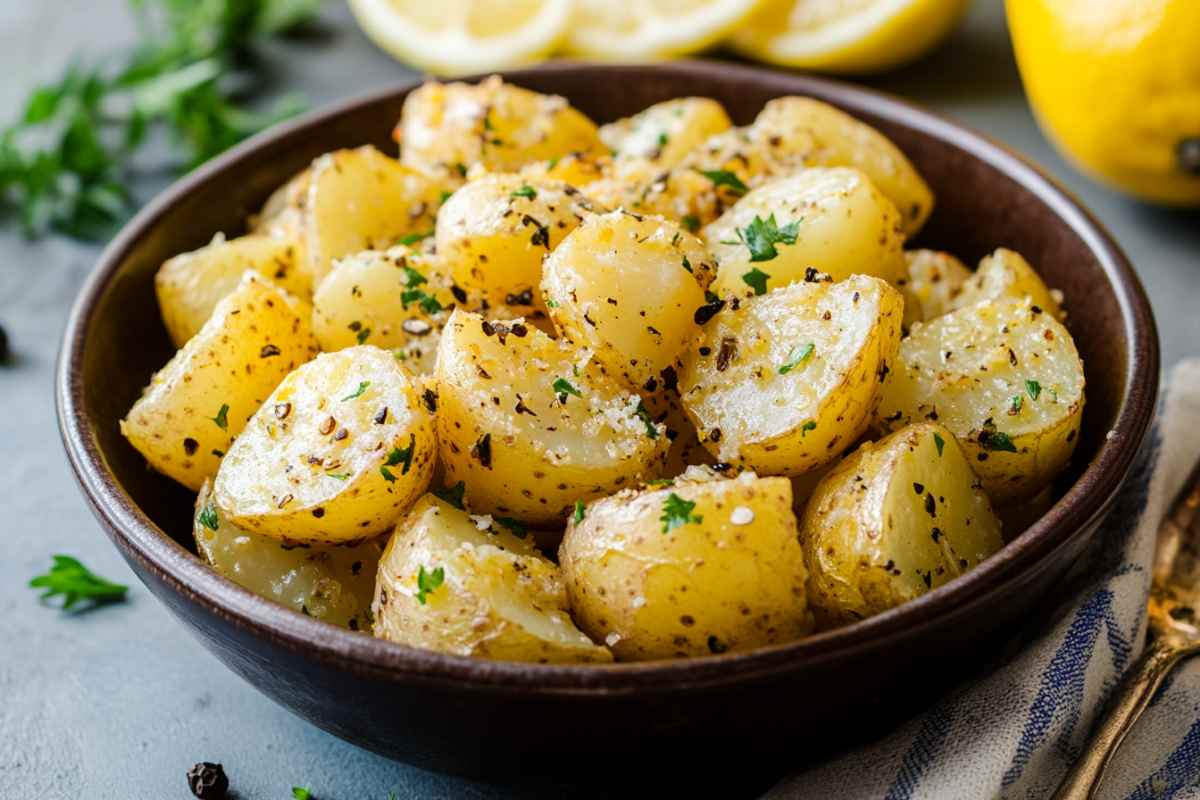The Greek Lemon Potatoes recipe, also known as patates lemonates, is a classic side dish in Greek cuisine that perfectly combines simplicity with bold flavors. Known for their crispy edges, fluffy interiors, and a tangy lemony taste, these potatoes are a favorite at family gatherings, festive occasions, and everyday meals. They pair well with a variety of main dishes, from grilled meats to seafood, making them a versatile addition to any table.
This guide will take you step-by-step through the process of making authentic Greek Lemon Potatoes. From selecting the right ingredients to understanding key cooking techniques and exploring popular variations, you’ll gain all the knowledge needed to prepare this beloved dish with confidence. Whether you’re a seasoned cook or a beginner, these potatoes are sure to impress and bring the flavors of Greece into your home.
What Are Greek Lemon Potatoes?
Texture and Flavor Profile
Greek Lemon Potatoes are celebrated for their unique blend of textures:
- The exterior becomes perfectly crispy due to the high roasting temperature and the addition of semolina.
- The interior is soft, tender, and fluffy, achieved through a combination of parboiling and slow roasting.
- The flavor is predominantly lemony, with a strong hint of garlic and a slight herbal note from oregano.
Traditional Significance
These potatoes are often a must-have at Greek gatherings, Sunday family meals, and festive occasions. They are commonly served alongside a wide range of main courses, including lamb dishes and roasted chicken, making them versatile.
Accompaniments and Complements
Greek Lemon Potatoes can complement an entire meal:
- Pair with grilled seafood, such as garlic shrimp, for a complete Mediterranean dining experience.
- Enjoy alongside a spread of meze dishes like hummus, dolmades, or a fresh Greek salad.
Why Are They So Popular?
Their popularity stems from their:
- Simple ingredients: Only a handful of pantry staples are needed to make these potatoes shine.
- Bold flavors: The combination of lemon, garlic, and oregano adds a punch of flavor that satisfies any palate.
- Ease of preparation: This dish is beginner-friendly, making it a great choice for those new to Greek cuisine.
Ingredients for Greek Lemon Potatoes
Detailed Breakdown of Main Ingredients
- Potatoes:
- Starchy varieties like Maris Piper, Russet, or Yukon Gold are ideal. These potatoes absorb flavors well and achieve the fluffy texture required for authentic Greek Lemon Potatoes.
- Potatoes should be cut into thick wedges to prevent them from breaking apart during roasting. The wedges also allow for more surface area to get crispy.
- Olive Oil:
- Use extra virgin olive oil for the best results, as it enhances the flavor while helping to achieve a crispy exterior.
- The rich, fruity notes of the olive oil complement the lemony flavors of the dish.
- Lemon Juice:
- Freshly squeezed lemon juice is essential for the classic tangy flavor.
- The amount of lemon juice can be adjusted to taste, depending on how zesty you prefer the potatoes.
- Garlic:
- Minced garlic adds depth to the dish. It can be added raw to the lemon sauce or roasted with the potatoes for a more mellow flavor.
- Oregano:
- Dried oregano is a staple herb in Greek cooking, adding an earthy note to the dish.
- You can also use fresh oregano as a garnish for a burst of color and additional aroma.
- Semolina:
- Sprinkling semolina over the potatoes before roasting creates an extra-crispy crust.
- Semolina helps to lock in moisture while providing a satisfying crunch.
Substitutions and Variations
- If you don’t have semolina, consider using cornmeal for a similar effect.
- Replace olive oil with a blend of olive oil and melted butter for a richer flavor.
- For a different citrus twist, try incorporating orange juice, as seen in the Citrus-Infused Chicken recipe.
Step-by-Step Preparation Guide
Step 1: Choose the Right Potatoes
- For this recipe, it’s crucial to use starchy potatoes like Russet, Maris Piper, or Yukon Gold. These potatoes absorb the lemon sauce effectively and become tender on the inside while crispy on the outside.
- Begin by washing the potatoes thoroughly to remove any dirt. Peel if desired, although leaving the skin on can add extra crispiness and a rustic texture.
- Cut the potatoes into thick wedges, approximately 1-2 inches wide. This allows the wedges to maintain their shape during cooking.
Step 2: Parboil the Potatoes
- Place the potato wedges in a large pot of salted water and bring to a boil.
- Parboiling helps soften the potatoes’ exterior, which will later absorb more of the lemon-garlic sauce.
- Boil for about 7-10 minutes, or until the potatoes are slightly tender but not falling apart.
- Drain the potatoes thoroughly using a colander and let them dry on a cooling rack for a few minutes. This step helps remove excess moisture, crucial for achieving the desired crispiness.
Step 3: Prepare the Lemon Sauce
- In a mixing bowl, combine:
- 3/4 cup extra virgin olive oil
- Juice of 2 large lemons
- 3 minced garlic cloves
- 1 tablespoon of dried oregano
- Salt and black pepper to taste
- Mix well until the ingredients are thoroughly blended, forming a slightly thick sauce.
Step 4: Coat the Potatoes
- In a large baking dish, place the parboiled potato wedges in a single layer.
- Pour the lemon sauce evenly over the potatoes, ensuring each wedge is coated.
- Sprinkle 2-3 tablespoons of semolina over the potatoes. Toss gently to distribute the semolina and coat the potatoes evenly.
Step 5: Roast the Potatoes
- Preheat the oven to 400°F (200°C).
- Roast for 35-40 minutes, flipping the potatoes halfway through to ensure even browning.
- To achieve maximum crispiness, increase the oven temperature to 450°F (230°C) for the last 10 minutes of cooking.
- Check the potatoes frequently to ensure they do not burn.
Step 6: Add Final Garnishes
- Before serving, drizzle a bit of olive oil and a squeeze of fresh lemon juice over the potatoes for added flavor.
- Garnish with freshly chopped parsley, oregano, or thyme for a burst of color.
Additional Tips for Enhanced Flavor
- For a smoky touch, add a pinch of smoked paprika to the lemon sauce.
- You can also try adding a few sprigs of rosemary or thyme to the roasting pan for a more herbal aroma, similar to the Herb-Infused Potatoes recipe.
Popular Variations of Greek Lemon Potatoes
1. Mustard-Infused Lemon Potatoes
- Adding 1-2 tablespoons of mustard to the lemon sauce introduces a tangy, sharp flavor that pairs well with the classic lemon and garlic.
- This variation is often served with roasted meats like baked ziti for an even bolder meal.
2. Orange-Glazed Lemon Potatoes
- Substitute half of the lemon juice with freshly squeezed orange juice. This creates a sweeter, more complex flavor profile that adds a hint of sweetness to the traditional tanginess.
- This variation works well with seafood, such as fish tacos.
3. Herb-Enhanced Lemon Potatoes
- Incorporate herbs like thyme, rosemary, or dill into the lemon sauce for a more aromatic version.
- This herbal touch is similar to the flavor found in dishes like zucchini soup, where herbs play a major role.
4. Spicy Greek Lemon Potatoes
- Add a dash of red pepper flakes or a chopped chili pepper to the lemon sauce for a spicy kick. This variation is great for those who enjoy a bit of heat in their dishes.
- Serve this spicy version alongside bold-flavored mains like beef curry for a robust meal.
5. Vegan Greek Lemon Potatoes
- Replace chicken broth with vegetable broth and add olives or capers to the baking dish for an extra layer of Mediterranean flavor.
- This vegan adaptation is an excellent complement to dishes like creamy cauliflower soup.
Serving Suggestions
Main Course Pairings
- These potatoes pair excellently with grilled meats like chicken souvlaki and lamb chops.
- For a full Mediterranean experience, serve the potatoes with seafood dishes like shrimp couscous salad.
Side Dish Combinations
- Serve with fresh Greek salad, a side of tzatziki, or bruschetta chicken for a flavorful combination.
- For a vegetarian meal, pair the potatoes with eggplant frittata or grilled vegetables.
Meal Presentation Tips
- Arrange the potatoes on a large platter, drizzle with olive oil, and add freshly chopped parsley for a vibrant presentation.
- For a rustic touch, serve in a cast-iron skillet, similar to the presentation in carrot soup.
Common Mistakes to Avoid
1. Using Waxy Potatoes
- Avoid waxy varieties like red potatoes or fingerlings, which do not achieve the desired fluffy texture. Starchy potatoes, as used in potato pizza, work best.
2. Not Drying the Potatoes After Parboiling
- Ensure the potatoes are well-drained and dried after parboiling. Excess moisture prevents them from crisping properly in the oven.
3. Failing to Flip During Roasting
- To achieve even crisping on all sides, flip the potatoes halfway through the roasting process.
4. Overcrowding the Baking Dish
- Overcrowding causes the potatoes to steam instead of roast. For the best results, use a large baking sheet or roast in batches.
5. Using Low Oven Temperatures
- Roasting at too low a temperature prevents the potatoes from developing the desired crispy exterior. Maintain a minimum temperature of 400°F (200°C), increasing to 450°F (230°C) during the last 10 minutes.
Batch Cooking and Storing Greek Lemon Potatoes
Batch Cooking Tips
- This recipe can be easily doubled or tripled for larger gatherings. Prepare in advance and store in the refrigerator until ready to roast.
- For a make-ahead option, fully cook the potatoes and store them in an airtight container. Reheat in the oven at 350°F (175°C) for 15-20 minutes.
Storing and Reheating
- Store leftover potatoes in an airtight container in the refrigerator for up to 3 days.
- To reheat, place the potatoes on a baking sheet and warm them in the oven to maintain their crispiness.
Freezing Instructions
- Cool the potatoes completely before transferring them to a freezer-safe container.
- To reheat, place the frozen potatoes directly in a preheated oven for 25-30 minutes until fully warmed through.
Frequently Asked Questions (FAQs)
Can I use different types of potatoes?
Yes, but starchy potatoes like Russet, Maris Piper, or Yukon Gold yield the best results. Waxy potatoes do not achieve the same fluffy interior.
What if I don’t have fresh lemons?
Freshly squeezed lemon juice is preferred, but bottled lemon juice can be used as a substitute. You may need to adjust the amount for a similar level of acidity.
How can I make them crispier?
- Ensure the potatoes are well-drained after parboiling.
- Increase the oven temperature to 450°F (230°C) during the last 10 minutes of roasting.
- Add extra semolina to enhance the crispy texture.
Can I make them in an air fryer?
Yes, air fry the potatoes at 400°F (200°C) for about 20-25 minutes, shaking the basket halfway through.
Are Greek Lemon Potatoes naturally gluten-free?
Yes, they are naturally gluten-free, as long as semolina is omitted or replaced with a gluten-free alternative like cornmeal.
Conclusion
Greek Lemon Potatoes are a beloved dish in Greek cuisine, offering a delightful mix of crispy edges, fluffy interiors, and a zesty lemon flavor. Their versatility allows them to complement a variety of main dishes, making them perfect for family gatherings, festive occasions, or even simple weeknight dinners. With basic ingredients like potatoes, olive oil, lemon juice, garlic, and oregano, this recipe brings bold, Mediterranean flavors to your table with ease.
By following the steps in this guide, you can master the traditional preparation of Greek Lemon Potatoes. The detailed instructions, along with various flavor-enhancing tips and creative variations, ensure that even beginner cooks can achieve impressive results. As you explore different ways to make this dish, you’ll discover how it can become a staple in your meal planning, adding a touch of Greek authenticity to your home cooking.

